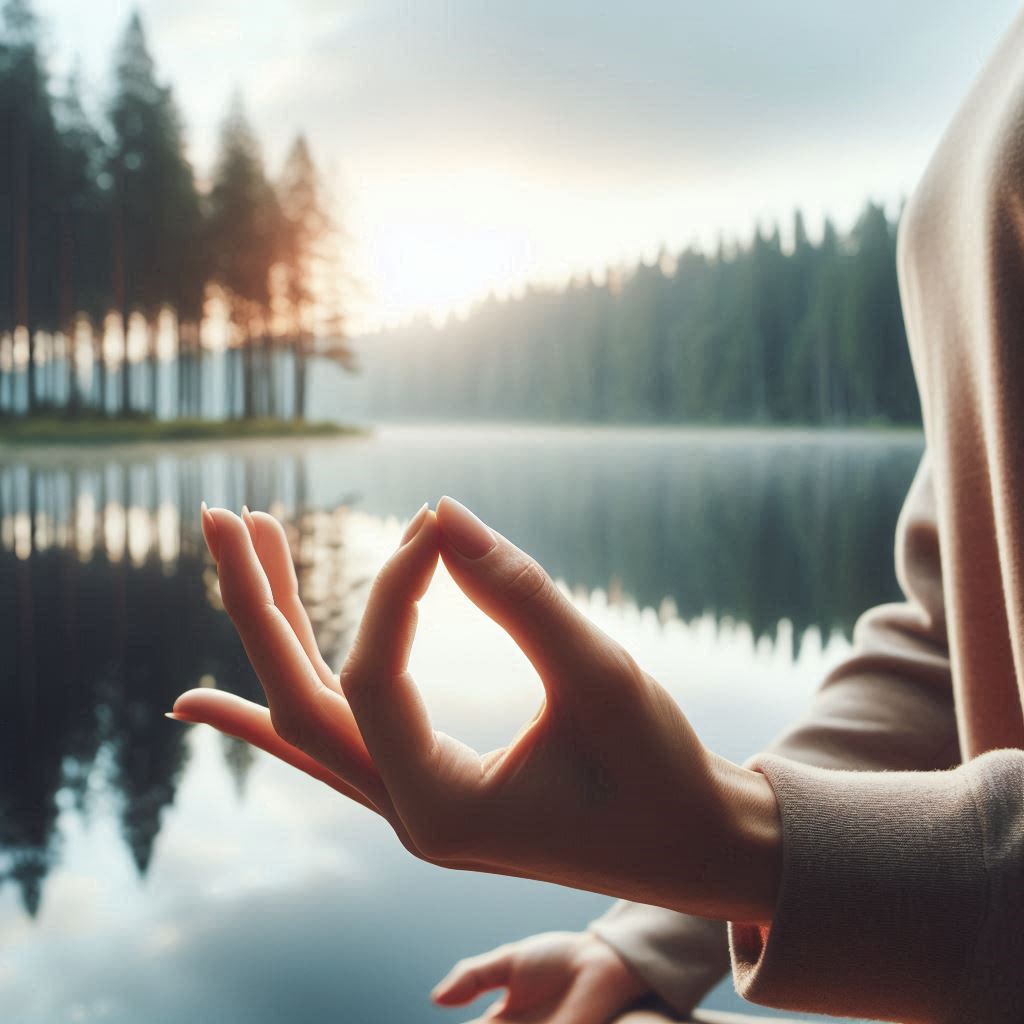
In our fast-paced world, finding inner peace can feel like an elusive dream. But the truth is, that cultivating a sense of calm and tranquility is within reach for everyone. This journey, however, isn’t about achieving a perfect state of serenity; it’s about developing tools and practices that guide you through life’s inevitable ups and downs with greater resilience and acceptance.
What Is The Secret To Finding Peace?
This article draws inspiration from the holistic approach of Moonbird [1], the mindfulness practices of Calm [2], the emotional regulation strategies of the Kentucky Counseling Center [3], the principles of intentional living from Oprah Daily [4], and expert tips on fostering joy and setting boundaries. We’ll also explore the importance of professional help, gratitude, forgiveness, and positive relationships in building a foundation for inner peace.
Mindfulness Practices For Inner Calm
The foundation of inner peace lies in present-moment awareness. As the Calm Blog suggests, cultivating mindfulness helps us step outside the constant chatter of our minds and connect more deeply with the present experience [2]. Here are some practices to embrace:
- Mindful Breathing: Deep, diaphragmatic breathing activates the parasympathetic nervous system, promoting relaxation and reducing stress [2]. Try the 4-7-8 technique: inhale for 4 seconds, hold for 7 seconds, and exhale slowly for 8 seconds. Repeat for a few minutes.
- Mindful Walking: Transform your daily walks into mindful journeys. Notice the sensations in your body as you walk, the sights and sounds around you, and the feeling of your breath.
- Body Scan: Lie comfortably and focus your attention on different parts of your body. Notice any sensations, such as tension or relaxation, without judgment.
Harnessing The Power Of Your Environment For Inner Harmony
The spaces we inhabit significantly impact our emotions. Inspired by the Kentucky Counseling Center’s approach [3], consider creating a calming environment:
- De-clutter your space: Physical clutter can contribute to mental clutter. Simplify your surroundings and create a sense of order.
- Bring in nature: Plants and natural light can boost mood and reduce stress. Surround yourself with elements of nature.
- Create a dedicated relaxation space: Set aside a quiet corner for meditation, reading, or simply slowing down.
Intentional Living: Building A Life Aligned With Your Values
Oprah Daily emphasizes the importance of intentional living, a philosophy that encourages us to make conscious choices that align with our values and purpose [4]. This process involves:
- Identifying your core values: What truly matters to you in life? Write down your values and refer to them when making decisions.
- Setting goals and boundaries: Set realistic goals that support your values and well-being. Learn to say no to activities that drain your energy.
- Practicing gratitude: Regularly reflecting on the things you are grateful for fosters a positive outlook.
Setting Boundaries And Prioritizing Joy
Setting boundaries, as discussed by many experts, is crucial for protecting your time and emotional well-being [5]. This includes:
- Learning to say no: It’s okay to decline requests that don’t align with your priorities.
- Communicating your needs: Clearly express your needs and limitations to others.
- Prioritizing activities that bring you joy: Make time for activities that fuel your happiness and sense of fulfillment.
Seeking Professional Help: When Inner Peace Feels Elusive
Sometimes, inner peace remains elusive due to underlying emotional struggles. The Kentucky Counseling Center reminds us that seeking professional help is a sign of strength, not weakness [3]. Therapists can provide tools for managing anxiety, depression, and other mental health conditions, ultimately contributing to greater peace.
The Power of Forgiveness, Gratitude, And Positive Relationships
Developing positive relationships and cultivating an attitude of gratitude and forgiveness are essential for inner peace. Here’s how:
- Practice forgiveness: Holding onto resentment only harms ourselves. Forgive others and yourself to let go of negativity.
- Nurture gratitude: Regularly express gratitude for the good things in your life, no matter how small.
- Build strong relationships: Invest time and energy in nurturing positive connections with supportive and uplifting people.
Actionable Exercises For Cultivating Inner Peace
Now that we’ve explored various strategies, let’s dive into practical exercises you can incorporate into your daily life:
- Mindful Walking Meditation: Take a short walk focusing on your breath and bodily sensations. Notice the sights, sounds, and smells around you without judgment.
- Gratitude Journaling: Before bed, write down three things you are grateful for that day.
- Loving-Kindness Meditation: Silently repeat phrases of kindness and well-being towards yourself, loved ones, neutral acquaintances, and even those who challenge you. This practice cultivates compassion and inner peace [6].
Remember, Cultivating Inner Peace Is A Journey, Not A Destination. There will be days when challenges test your resilience, and that’s perfectly okay. The key is to be gentle with yourself, pick yourself up when needed, and recommit to your practices. Over time, with consistent effort, you’ll experience a greater sense of calm, clarity, and acceptance – the hallmarks of inner peace.
Unleash Hidden Potential & Inner Calm in Minutes. The Secret Weapon for Relaxation You Never Knew Existed.
How Do People Find Inner Peace?
- Meditate. Meditation is about mental silence.
- Take a break from social media.
- Practice breathwork.
- Be kind to the world around you (and to yourself).
- Take a walk in nature.
- Laugh as much as you can.
- Express yourself.
- Practice everyday mindfulness.
What Causes Lack Of Inner Peace?
Understanding the causes of a lack of inner peace can help individuals address and overcome these obstacles. Common causes include:
- Chronic Stress: Persistent stress from work, relationships, or financial pressures can disrupt mental calmness and lead to anxiety.
- Negative Thought Patterns: Engaging in negative self-talk and pessimistic thinking can prevent inner peace and exacerbate feelings of hopelessness.
- Emotional Turmoil: Unresolved emotions, such as anger, guilt, or grief, can create internal conflict and hinder emotional balance.
- Lack of Self-Care: Neglecting self-care practices, such as adequate sleep, nutrition, and exercise, can affect both physical and mental well-being.
- Cluttered Environment: A disorganized or chaotic living space can increase stress levels and impede relaxation.
- Unhealthy Relationships: Toxic relationships and lack of support can contribute to emotional instability and stress.
By incorporating these strategies and resources into your life, you can embark on a journey towards inner peace. Remember, you are not alone on this path. There are numerous tools and support systems available to guide you toward greater emotional well-being and a life filled with serenity and purpose.
References:
- [1] Moonbird: https://www.moonbird.life/magazine/8-tips-for-inner-peace/
- [2] Calm: https://www.calm.com/mindfulness
- [3] Kentucky Counseling Center: https://kentuckycounselingcenter.com/
- [4] Oprah Daily: https://www.oprahdaily.com/
- [5] Psychology Today: https://www.mypsychnetwork.com/the-key-to-happiness-setting-boundaries/
- [6] Greater Good Science Center at the University of California, Berkeley: https://ggia.berkeley.edu/practice/practice_as_pdf/loving_kindness_meditation?printPractice=Y
The Science Behind Inner Peace:
-
Mindfulness and Stress Reduction: According to a study published in JAMA Internal Medicine, mindfulness meditation can reduce symptoms of anxiety, depression, and stress by 30%.
-
Gratitude and Mental Health: Research from the Greater Good Science Center at UC Berkeley found that practicing gratitude can improve psychological health by 10%, enhancing happiness and reducing depression.
-
Nature and Well-being: A study by the University of Exeter showed that spending at least 120 minutes in nature each week is associated with good health and well-being.
-
Meditation Benefits: The National Institutes of Health reports that meditation can reduce blood pressure, symptoms of irritable bowel syndrome, and insomnia, contributing to overall inner peace.
-
Decluttering and Mental Health: According to a study published in Personality and Social Psychology Bulletin, a cluttered home environment can increase stress levels, with participants reporting a 20% increase in cortisol levels when living in cluttered spaces.
References:
-
-
JAMA Internal Medicine: https://jamanetwork.com/journals/jamainternalmedicine
-
Greater Good Science Center: https://greatergood.berkeley.edu
-
University of Exeter: https://www.ecehh.org
-
National Institutes of Health: https://www.nih.gov
-
Personality and Social Psychology Bulletin: https://journals.sagepub.com/home/psp
-



